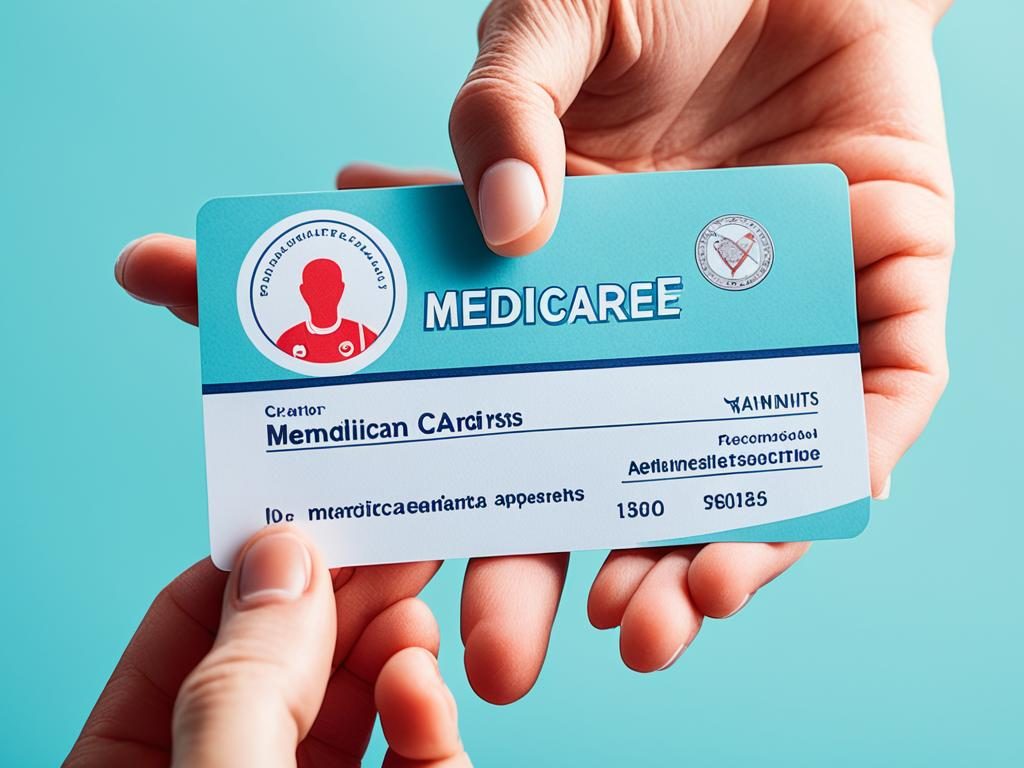When it comes to retirement planning, it’s important to consider not only your finances but also your healthcare needs. Retirement healthcare planning is a key aspect of ensuring a secure and comfortable future. By incorporating healthcare considerations into your financial strategies, you can better prepare for retirement and achieve your income goals while safeguarding your well-being.

Key Takeaways:
- Retirement healthcare planning is essential for a financially secure retirement.
- Consider your retirement income goals and identify income sources.
- Understand popular retirement accounts like IRAs and 401(k) plans.
- Educate yourself about Medicare and its different parts.
- Estimate future healthcare expenses, including prescription medications and long-term care.
Understanding Medicare for Retirement
When planning for retirement, understanding Medicare is essential for making informed decisions about healthcare coverage. Medicare is the federal health insurance program specifically designed for individuals aged 65 and older. It consists of different parts that provide comprehensive coverage for various healthcare needs.
Let’s take a closer look at the different parts of Medicare:
- Part A: Medicare Part A covers hospital insurance, including inpatient care, skilled nursing facility care, and hospice care.
- Part B: Medicare Part B offers medical insurance, including outpatient services, doctor visits, preventive care, and durable medical equipment.
- Part C: Also known as Medicare Advantage, Part C combines the benefits of Part A and Part B, and it may also include additional coverage, such as vision, dental, and prescription drug coverage.
- Part D: Medicare Part D provides prescription drug coverage, helping beneficiaries manage the costs of necessary medications.
Medicare Advantage plans, offered through private insurers, are an alternative to Original Medicare (consisting of Part A and Part B), providing all-in-one coverage that often includes prescription drug coverage and additional benefits.
It’s important to note that Medicare has different enrollment periods and specific criteria for eligibility. Understanding these enrollment periods and eligibility requirements is crucial to ensure timely and uninterrupted access to healthcare coverage.
Benefits of Medicare:
Medicare offers several benefits for retirees, including:
- Access to a wide network of healthcare providers
- Protection against high medical costs
- Prescription drug coverage options
- Flexibility to choose between Original Medicare and Medicare Advantage
- Additional coverage options for dental, vision, and hearing needs
Medicare plays a crucial role in ensuring retirees have access to affordable and comprehensive healthcare coverage. By understanding the different parts of Medicare and the benefits they offer, individuals can make informed decisions that align with their healthcare needs and retirement goals.

Estimating Healthcare Expenses in Retirement
Planning for healthcare expenses in retirement is a crucial part of securing your financial well-being. It is important to estimate the costs associated with various healthcare needs during retirement, such as prescription medications, routine check-ups, and potential long-term care requirements.
Prescription medications can be a significant expense for retirees. As you age, the likelihood of needing medications to manage chronic conditions increases. It is essential to consider the potential cost of these medications when estimating your healthcare expenses in retirement.
Routine check-ups and preventive care are vital for maintaining good health as you age. These can include visits to your primary care physician, specialists, and screenings for early disease detection. It is important to factor in the costs associated with these regular appointments when estimating your healthcare expenses.
In addition, long-term care is a consideration that cannot be overlooked. Long-term care services can include assistance with daily activities, such as bathing, dressing, and eating, either at home or in a facility. These services can be expensive, and it is important to plan for the associated costs in your retirement healthcare budget.
One way to help mitigate the financial burden of healthcare expenses in retirement is by exploring healthcare insurance options. Long-term care insurance, for example, can provide coverage for the costs associated with long-term care services. This type of insurance can help protect your retirement savings from being depleted by the high costs of long-term care.
Estimating Healthcare Expenses in Retirement Table
| Healthcare Expense | Estimated Cost |
|---|---|
| Prescription Medications | $XXX per month |
| Routine Check-ups | $XXX per year |
| Long-term Care | $XXX per month or $XXX per year |
By estimating your healthcare expenses in retirement and including them in your overall financial plan, you can ensure that you have enough savings to cover these costs and enjoy a secure retirement. Exploring healthcare insurance options like long-term care insurance can provide additional peace of mind and protection against unexpected healthcare expenses.

Retirement Savings Strategies
When it comes to planning for retirement, it’s crucial to consider not only your overall financial goals but also your healthcare expenses. Retirement savings strategies play a vital role in ensuring a secure financial future while also covering potential healthcare costs.
One effective retirement savings strategy is to contribute to retirement accounts such as 401(k)s and IRAs. These accounts offer tax advantages and allow your money to grow over time. However, it’s important to explore additional options that specifically cater to healthcare expenses, such as health savings accounts (HSAs) and flexible spending accounts (FSAs).
An HSA is a tax-advantaged account that allows individuals with high-deductible health insurance plans to save for medical expenses. Contributions to an HSA are tax-deductible, and withdrawals are tax-free if used for qualified medical expenses. This makes HSAs a valuable tool for covering healthcare costs during retirement.
Similarly, FSAs are another tax-advantaged account that allows individuals to set aside pre-tax dollars to pay for eligible healthcare expenses. FSAs are typically offered through an employer and can be used for various medical expenses, including deductibles, prescription medications, and co-payments.
Creating a budget for out-of-pocket costs is also crucial in retirement planning. It’s important to factor in expenses such as prescription medications, routine check-ups, and potential long-term care needs. By considering these costs early on, you can ensure that your retirement savings are allocated accordingly.
Moreover, long-term care insurance is an essential consideration when planning for potential healthcare expenses in retirement. This insurance provides coverage for assistance with activities of daily living, such as bathing, dressing, and eating, which are not covered by traditional health insurance plans. Long-term care insurance helps protect retirement savings from the potentially high costs of long-term care services.
Benefits of Retirement Savings Strategies:
- Tax advantages: Retirement accounts like 401(k)s, IRAs, HSAs, and FSAs offer tax benefits, reducing your taxable income and potentially saving you money.
- Protection against out-of-pocket costs: Budgeting for out-of-pocket expenses helps you prepare for unexpected healthcare costs and avoid dipping into retirement savings.
- Peace of mind: Long-term care insurance provides financial protection and peace of mind, ensuring that you have coverage for potential healthcare expenses that may arise as you age.
By implementing these retirement savings strategies and considering the various healthcare-related accounts and insurance options available, you can better safeguard your retirement savings and prepare for your future healthcare needs.
Creating a Retirement Financial Plan
When it comes to planning for retirement, it’s important to develop a comprehensive retirement financial plan that will ensure financial security during your golden years. This plan should encompass various aspects of retirement, including setting retirement income goals, determining savings strategies, and choosing the right retirement accounts that align with your financial objectives.
One crucial component of a retirement financial plan is understanding how to fill in the gaps of Medicare coverage. This is where Medigap policies come into play. These policies are designed to supplement Medicare and help cover expenses such as deductibles, copayments, and coinsurance that Medicare doesn’t fully cover. By considering Medigap policies as part of your retirement financial plan, you can ensure comprehensive healthcare coverage and minimize out-of-pocket expenses.
It’s also essential to regularly review and adjust your retirement plan based on changing circumstances and stay informed about healthcare policy changes. This proactive approach will help you adapt your financial strategies and ensure that your retirement financial plan remains effective and relevant.
“A well-crafted retirement financial plan takes into account not only your retirement income goals, but also factors in your healthcare needs and expenses. By understanding your options and making informed decisions, you can create a plan that provides financial security and peace of mind.”
Here’s an example of a retirement financial plan table that outlines different elements to consider:
| Element | Description |
|---|---|
| Retirement Income Goals | Set specific financial targets for retirement, taking into account living expenses, healthcare costs, and desired lifestyle. |
| Savings Strategies | Determine how much to save, where to invest, and what retirement accounts to contribute to (e.g., 401(k), IRAs). |
| Medigap Policies | Research and choose the right Medigap policy to supplement Medicare and cover additional healthcare costs. |
| Regular Review | Periodically evaluate and adjust your retirement financial plan to account for changes in healthcare policies and personal circumstances. |
By following a comprehensive retirement financial plan, you can have the confidence and peace of mind knowing that you have taken the necessary steps to secure your financial future. Remember, it’s never too early to start planning for retirement, so take the initiative today and create a solid foundation for your retirement years.
Conclusion
Planning for healthcare costs in retirement is a crucial aspect of securing a financially stable and healthy future. By understanding options such as Medicare, estimating healthcare expenses, and incorporating healthcare considerations into a retirement plan, individuals can approach their golden years with confidence and peace of mind.
Early and thoughtful retirement planning is the key to ensuring an enjoyable and financially sustainable retirement. It is essential to create a comprehensive retirement plan that takes into account not only retirement savings but also anticipated healthcare costs. By starting the retirement planning process early and regularly reviewing and adjusting the plan, individuals can maximize their financial well-being.
A secure retirement requires diligent savings strategies and a thorough understanding of healthcare expenses. Considering options such as health savings accounts and long-term care insurance can help individuals mitigate the impact of healthcare costs on their retirement savings. By proactively addressing healthcare expenses and incorporating them into a retirement financial plan, individuals can protect their financial well-being and enjoy a secure retirement.
FAQ
What is retirement planning?
Retirement planning involves determining retirement income goals, identifying income sources, managing assets and risk, and estimating future cash flows.
Why is it important to start retirement planning early?
Starting retirement planning early allows for more time to save and invest, increasing the likelihood of achieving financial goals in retirement.
What are popular retirement plans?
Popular retirement plans include individual retirement accounts (IRAs) and employer-sponsored 401(k) plans.
What is Medicare?
Medicare is the federal health insurance program for individuals aged 65 and older.
What does Medicare cover?
Medicare has different parts that cover hospital insurance (Part A), medical insurance (Part B), Medicare Advantage (Part C), and prescription drug coverage (Part D).
How can I estimate healthcare expenses in retirement?
Estimating healthcare expenses in retirement requires considering costs for prescription medications, routine check-ups, and potential long-term care needs.
Can healthcare insurance options help with retirement healthcare costs?
Exploring healthcare insurance options, such as long-term care insurance, can help mitigate financial burdens associated with retirement healthcare costs.
What are retirement savings strategies?
Retirement savings strategies include contributing to retirement accounts such as 401(k)s, IRAs, and health savings accounts (HSAs).
Are there any tax advantages for healthcare expenses?
Yes, health savings accounts (HSAs) and flexible spending accounts (FSAs) offer tax advantages for healthcare expenses.
How can I create a retirement financial plan?
A retirement financial plan should include setting retirement income goals, determining savings strategies, and choosing the right retirement accounts.
What are Medigap policies?
Medigap policies are insurance plans that help fill in gaps in Medicare coverage.
How often should I review and adjust my retirement plan?
It is important to regularly review and adjust the retirement plan based on changing circumstances and stay informed about healthcare policy changes.
Why is early retirement planning important for financial well-being?
Planning for healthcare costs in retirement is a crucial aspect of securing a financially stable and healthy future.


